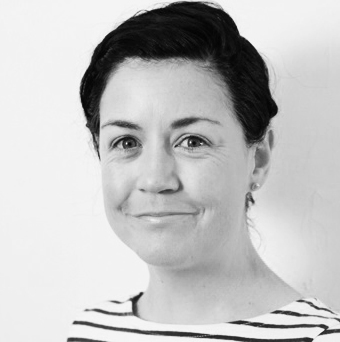Global Keto #KETO2021 comes to Brighton!
The 7th Global Symposium on Medical Ketogenic Dietary Therapies: 19th– 22nd October Brighton Hilton Metropole.
What is Global Keto?
The symposium is unique in that it brings together health professionals, researchers, and industry representatives from many different disciplines, including basic science, clinical research, clinical practice, and product development. The first global symposium was held in Phoenix in 2008, and we have come together every two years since. Although, this symposium was delayed by a year due to the Coronavirus pandemic. Emma Williams and Julie Fountain of Matthew’s Friends were instrumental in organising the event and ensuring it ran smoothly. This symposium was particularly special as we celebrated 100 years of ketogenic diet (KD) therapy!
The symposium organising committee ensured we had all the essentials for a really great week of immersion in KD therapies:
-
UK and International experts sharing the latest research and developments in the world of ketogenic diet (KD) therapies
-
the launch of the International Neurological Ketogenic Society (INKS)
-
live keto cooking demonstrations
-
sponsor led symposiums and exhibitor stands
-
poster presentations showcasing research and KD service developments (check out The Keto Dietitian’s two posters here and here on the CORE-KDT study)
-
a 1920s gala dinner to celebrate 100 years of KD therapies!
For me personally, it was the launch of The Keto Dietitian – finally sharing my business plans with colleagues after many months of development and planning. It was so lovely to receive such positive feedback and support. Many exciting opportunities and collaborations arose, so watch this space!!
Read on for an overview of what The Keto Dietitian got up to over the week…
Monday – Ketogenic Dietitians Research Network (KDRN) AGM
Many KDRN members arrived in Brighton a day early to join the AGM. We were also joined online by those who couldn’t attend in person. It was AMAZING to see so many friends again, catch up over lunch and share progress on our collaborative projects.
I’m on the committee as one of ‘Team Publicist’, so I updated members on our shiny new KDRN webpage. We had a super productive meeting – revisiting ongoing projects and brainstorming our future plans. These include practical KD resource development, the use of KD in intensive care, improving access to KD for adults and investigating if the results gained while on KD are maintained after the diet is discontinued. Many KDRN members supported recruitment for the CORE-KDT study I lead, so I provided a brief update on progress and a huge thank you to all for their support.
We were delighted to have an information stand at GlobalKeto 2021. It enabled us to grow our membership and share our progress in developing clinical practice and the evidence base for KD through collaborative research.
Tuesday – KD therapy – Past, Present and Future
Professor Eric Kossoff opened the symposium by bringing us back in time to the early 1920s. He took us on a journey exploring the early uses of KD and the pioneering clinicians who led the way. It’s hard to imagine a time before the internet and the challenges faced by those early KD pioneers in trying to connect and collaborate.
Professor Helen Cross then brought us into the present, reflecting on KD therapy uses over the last ten years or so. She described her journey with her first patient on KD therapy, planting the seeds for the first randomised controlled trial in paediatric epilepsy treated with KD (Neal et al., 2008). This trial was led by Dr Liz Neal of Matthew’s Friends, together with Hannah Chaffe and Professor Cross, and demonstrated the efficacy of KD therapy in managing childhood epilepsy. Helen and Emma Williams met as Matthew, Emma’s son, started a KD and the rest is history as they say, with Matthew’s Friends charity launched in 2004.
There have been significant developments for patients over the last 20 years. Many find it easier to connect with a keto team; however, it is not progressing at the pace we would like, especially for adult patients. Here at The Keto Dietitian, I am passionate about improving access to KD therapy for both children and adults. I do not operate a waiting list and we begin preparation and education for KD within one week of initial contact.
Professor Jong Ro then transported us into the future, where we hope KD will be used more often as first-line therapy, adults will have greater access, and KD use will grow in areas beyond epilepsy. He launched the International Neurological Ketogenic Society (INKS). Their mission is to promote the practice and science of KDs and related metabolism-based therapies for neurological disorders. INKS aims to drive global accessibility to KD therapies through collaborative research, training, education and outreach.
Red Goat Productions were filming throughout the week, producing informative vlogs. Michelle from Red Goat was great for putting you at ease during filming. You can tell we are all feeling the excitement and buzz of being back together in person!
It was so good to sit down around a table together and move shared projects forward with a coffee or the odd glass of wine in hand! There’s always great energy, buzz and enthusiasm at the symposium but particularly this year after nearly 18 months of online meetings. To be able to share ideas and brainstorm in person again was amazing! It was my first time in Brighton, and it’s a really vibrant seaside city… with great seafront coffee, bars and restaurants – well worth the 5-hour drive from Cornwall! I enjoyed the opportunity to explore the seafront, and all the city has to offer.
Wednesday – Practicalities of KD administration
Day 2 was packed with the practicalities of implementing and sustaining KD from infants right through to adults. I was honoured to be asked to be a conference chair for two sessions during the symposium, partnering with Beth Zupec-Kania (RDN, CD) to chair this first session.
The session had four great speakers who addressed the practicalities of supporting individuals to undertake KD. Topics included; factors that influence KD compliance and efficacy, developing a KD service, tailoring it to available resources and sustaining the service during a pandemic. We led the Q&A sessions that followed, taking questions from delegates, both in-person and online.
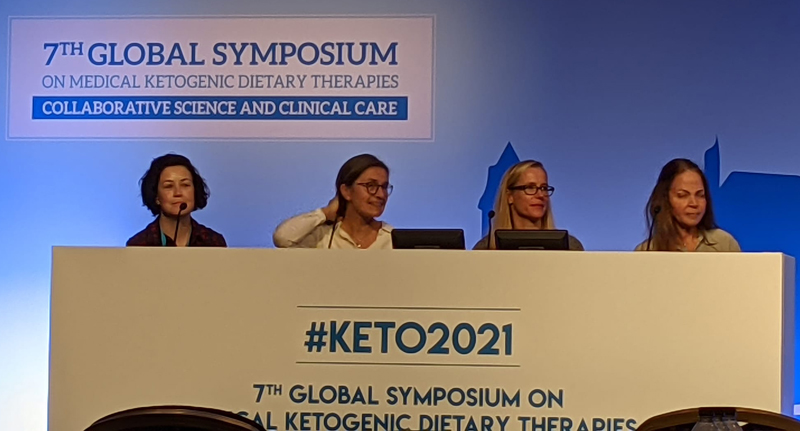
It was particularly interesting to hear Mackenzie Cervenka speak about the International Recommendations for the management of KD in adults and Prof Colin Doherty speak about the practicalities of KD provision for adult patients in Ireland. Paediatric guidelines have been available since 2008, so this is a significant step forward for KD provision for adults. We are pushing for increased services for adults, so it was great to see such a mix of adult and paediatric applications on the Global Keto programme.
Nutricia sponsored an evening symposium on non-seizure related benefits of KD therapy in epilepsy. Dr Anita Devlin provided a brilliant overview of the current clinical evidence regarding non-seizure related outcomes. After years of exploring this for my PhD, Anita did an excellent job covering this in just 20 minutes. She very kindly shared an update on our CORE-KDT study that I’m leading for my PhD. It was a proud moment to see it shared on the big screen and then to share the future plans in the Q&A session that followed. Dr Stewart Rust, a neuropsychologist, gave a really engaging and insightful presentation, sharing patient and families’ experiences of ketogenic diet therapy.
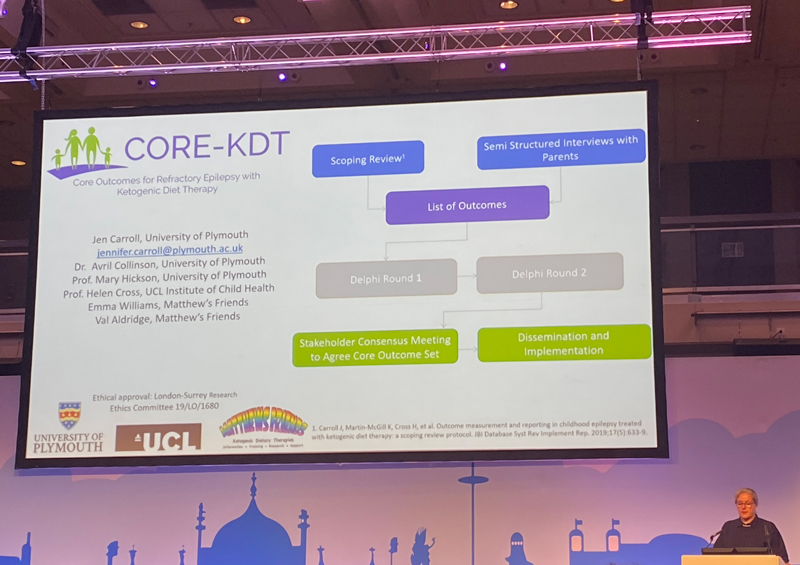
Thursday – Practicalities of KD Administration and Beyond the Epilepsies
Thursday started with a breakfast meeting to explore how the CORE-KDT core outcome set could support and underpin future work on outcomes. I chaired another great session with Susan Wood (RD), where speakers addressed flexibility between KD protocols, managing concomitant medication, monitoring efficacy and weaning from KD. Beyond the epilepsies, speakers addressed Glut 1 deficiency syndrome, zoopathies, autism and neurodegenerative disease.
Next up was the poster presentations. It’s always an excellent opportunity to see what research, audits and service evaluations are underway. I had two posters accepted to share the results thus far from the CORE-KDT study. The first poster details ‘The Highs and Lows of Epilepsy and KD Therapy’ sharing families’ experiences as told by 21 parents who kindly agreed to be interviewed. They shared their early experiences with their child’s epilepsy diagnosis, trying to access KD through to the day-to-day management and weaning from KD. It concludes with five key recommendations that parents feel could make KD easier.
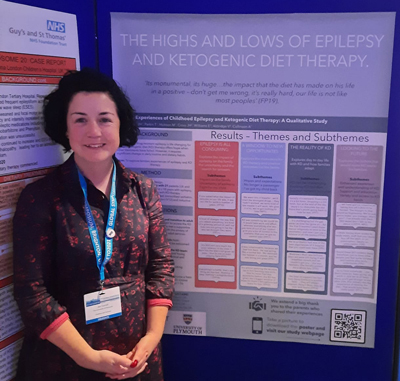
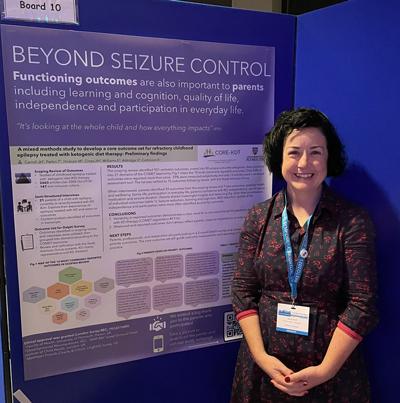
The second poster, ‘Beyond Seizure Control’, details the identification of a comprehensive list of outcomes for children with epilepsy treated with KD therapy via a scoping review of the literature and interviews with parents. It explores parents’ priority outcomes compared to those measured in research studies.
I mentor and supervise specialist paediatric dietitians with their MSc research and dissertations and was delighted to have a poster accepted with a past student Tammy Ives and her colleagues. Her service evaluation compared clinical outcomes in their district general hospital with other more extensive trials and explored the barriers and facilitators to the success of their service via a focus group. Prof Eric Kossoff led an impromptu poster presentation session via Zoom for his colleagues who couldn’t travel, taking them on a tour of the posters. It was good fun sharing the CORE-KDT story so far, followed by a customary Kossoff fist bump!
After the poster presentations, it was time for a rapid costume change into a 1920’s flapper dress, and off to the ball we went! Matthew’s Friends hosted the symposium gala dinner at the Grand Hotel Brighton, a fitting location for a 1920s, vintage, anything goes themed evening. The Queen tribute band were the highlight of the evening, filling the dance floor from the first guitar riff.
Friday – KD Beyond the Epilepsies
On Friday we had presentations exploring KD use in mental illness, migraine, Alzheimer’s disease, diabetes, brain cancers and cancer beyond the brain. Much of this work is still in the early stages of research with case studies or small studies, but they show promise for how our use of KD therapies may continue to expand in the coming years. Dr Adrienne Scheck and Professor Michael Jenkinson brought us up to speed on the utilisation of KD in brain cancers, concluding that KD is safe and feasible for individuals with brain tumours. However, it is proving very challenging for patients to access KD in clinical practice, owing to the absence of large human clinical trials exploring the efficacy of KD in brain tumours. Here at The Keto Dietitian, we work with individuals and their neuro-oncology team to ensure they are supported to undertake KD safely.
Dr Cherubino Di Lorenzo provided an overview of the role KD may play in the management of migraines, including his teams’ research in this clinical area. Earlier this year, clinical recommendations were published which should help guide KD use for those with migraines (Di Lorenzo et al., 2021). The Keto Dietitian will support individuals with migraines to undertake KD, in collaboration with their local team.
These events are always an excellent opportunity to catch up on new products and developments that we can share with the individuals we are supporting to undertake KD therapy. Chef Derek from Nutricia, Chef Neil from Vitaflo, Cambrooke Keto Chef and KetoCook Mo from Matthew’s Friends all did live cooking demos. A whole host of keto goodies were available for us to taste and recipes for us to share. Let’s be honest; we all love a goodie bag, samples and resources!
So, where to next?
We now individually reflect on the insights and learning gained over the week, culminating in developments to our KD services and ultimately improving the access and experiences for families and individuals.
Personally, since the Symposium I’ve been busy following up on all the collaborative discussions had over coffee breaks with the aim of driving my research and collaborations forward in preparation for the 8th Global Symposium on Ketogenic Therapies in California 17 – 21 September 2023.

